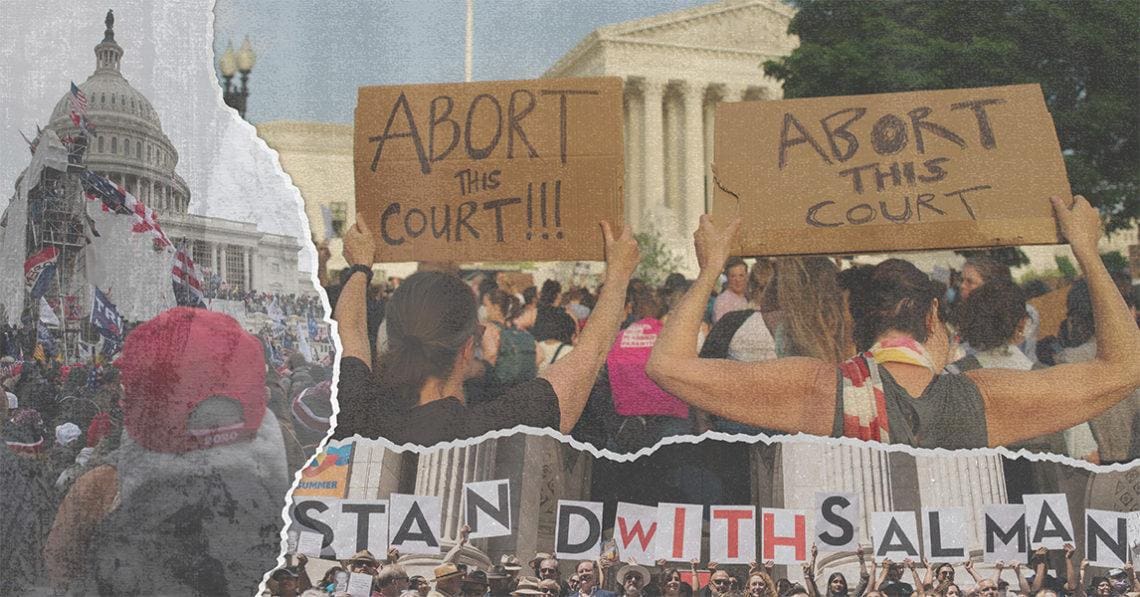Rising political and cultural tensions are undeniable. But just as there remain political leaders with convictions, ethics and compliance consultant Lisa Schor Babin says corporate leaders need to understand that now is the time to screw their courage to the sticking place.
Political rhetoric and dog whistling are not newcomers to the national scene. What is new and, frankly, frightening is that angry people and disenfranchised, marginalized and otherwise fragile individuals are taking misguided cues from this language of our leaders as their personal call to action.
What’s more, their threats and acts of violence target people doing their jobs to protect the rights, health, well-being and values of this country. Consider the Jan. 6 riot, attacks against the FBI and its agents following its search of former President Donald Trump’s Mar-a-Lago home, an assassination plot against U.S. Supreme Court Justice Brett Kavanaugh, threats and lawsuits against an Indiana physician and the recent near-fatal stabbing of author Salman Rushdie.
The dangerous power of political rhetoric
While the perpetrators are being held to account for these egregious attacks and threats, let this fact not distract us from the culpability of this country’s leadership and the rhetoric delegitimizing our institutions, dehumanizing our officials, vilifying our gatekeepers and legitimizing violence as a form of expression toward the very people who are risking their lives for our freedom and safety.
By definition, rhetoric is designed to have a persuasive impact on its audience, and experts note that veiled threats to violence and dehumanizing language can contribute to threats as much as direct calls to action. Robert Pape, a University of Chicago professor studying political violence, found in his research that 15 million to 20 million American adults believe that violence would be justified to return Trump to office.
“Community support lowers the threshold at which volatile people will take action,” Pape told The New York Times, “because he or she will tell themselves that people in the community actually support them. Maybe it’s only 10 percent of the community, but that’s still a large group.”
Rhetoric escalates to a tipping point, eventually spilling over — and moving from mere words to actions, former New Jersey Attorney General John Farmer told the Associated Press.
“When messaging reaches a certain pitch, things start to happen in the real world,” said Farmer, a one-time federal prosecutor who now heads up the Eagleton Institute of Politics at Rutgers University. “And when people in positions of power and public trust start to echo extremist rhetoric, it’s even more likely that we’re going to see real-world consequences.”
These forces are taking their toll; according to a recent NBC News poll, voters believe the top issue facing the country is the threat to democracy.
Delegitimization of elections
On Jan. 6, 2021, the day Congress was to ratify the 2020 electoral votes, Trump claimed at a rally near the White House that the election had been rigged and urged his followers to “fight like hell” to stop what he said was a stolen outcome. Many of his supporters walked to the Capitol from the rally and took part in the violence. Rioters yelled, “Hang Mike Pence!” Gallows were erected.
Trump fueled the discord around election irregularities, and then minimized the violence later that day, tweeting that “the insurrection took place on November 3rd, it was the completely unarmed protest of the rigged election that took place on January 6th.”
The rhetoric continues as we go into midterm election season. Ohio Rep. Anthony Gonzalez, one of 10 House Republicans who voted to impeach the former president, chose to retire rather than run again, citing threats against him and his family. Michigan Rep. Peter Meijer, another House Republican who voted for impeachment, lost his primary, essentially being told by voters, “You don’t have to believe the election is stolen. The important thing isn’t believing it, it’s saying it.”
Mark Finchem, who has identified himself as a member of the Oath Keepers militia in the past, won the Republican nomination for Arizona secretary of state. If elected, Finchem could, as the official who oversees the state office administering the 2024 presidential election, have the power to affect the outcome of the race.
Demonization of the FBI
Trump and his allies have demonized the FBI and attempted to turn the country against the agency, calling it a rogue “woke Democratic deep state mob.” Yet, one agent told The Guardian in the days before the 2016 election that the FBI is “Trumpland.”
By at least one measure, the bureau still remains the least “woke” corps of federal agents: It is the last and only one of the top dozen federal law enforcement agencies — including the Immigration and Customs Enforcement, Border Patrol, the Drug Enforcement Administration, the Secret Service and the Park Police — that has never had a woman or person of color lead the agency.
In the days since the FBI searched his home at Mar-a-Lago, it has been criticized for its approach to Trump, with calls to defund the agency, echoing the racial justice-inspired movement to defund the police. Rep. Marjorie Taylor-Greene tweeted, “Impeach Merrick Garland, gut the DOJ, defund the corrupt FBI, and Impeach Biden.”
Law enforcement officials across the country are warning about an increase in threats and the potential for violent attacks on federal agents or buildings in the wake of the FBI’s search of Mar-a-Lago. There is also concern for the safety of the witnesses named in the affidavit that authorized the search.
“The threats are ominously similar to the online rhetoric that preceded the Jan. 6, 2021 attack on the U.S. Capitol,” said Rep. Bennie Thompson, a Mississippi Democrat who chairs the House’s Jan. 6 committee. “These threats of violence and even civil war … are not only un-American but are a threat to our democracy and the rule of law.”
Threats and acts of violence
According to a Washington Post-University of Maryland poll, an average of 34% of Americans (40% of Republicans, 41% of independents and 23% of Democrats) say violence against the government is sometimes justified. This is an alarming finding but one that comes as no surprise as threats of political violence and actual attacks have become a steady reality of American life, affecting school board officials, election workers, flight attendants, librarians and even members of Congress.
Even those not involved with the government or law enforcement have been on the receiving end of threats. Dr. Caitlin Bernard provided abortion services to a 10-year-old girl who could not get an abortion in her home state of Ohio and was forced to travel to neighboring Indiana, where the procedure was legal. Bernard has since found herself the target of an investigation by Indiana’s Republican Secretary of State and has hired a security detail due to threats.
But Bernard is not alone, as the rhetoric over abortion has often turned violent. A recent report found that violent incidents, including assault, vandalism, stalking and bomb threats, against abortion providers more than doubled in 2021.
Salman Rushdie, the famed author and subject of a 1989 fatwa, signed an open letter in 2020 decrying an increasingly “intolerant climate” and warning that the “free exchange of information and ideas, the lifeblood of a liberal society, is daily becoming more constricted.” More recently, Rushdie was nearly killed after being stabbed multiple times by an assailant as he began a planned speech at an intellectual retreat in western New York.
“The idea that being offended is a valid critique has gained a lot of traction, he told The Guardian in 2021. On August 13, 2022, Salman Rushdie was stabbed roughly 10 times as he prepared to speak at the Chautauqua Institution in western New York.
A call for political courage
We are in desperate need of political courage. While we may not share their political views and also recognize political ambition behind their actions, we should still applaud the efforts of political leaders like former Vice President Mike Pence, who called on Republicans to stop attacking the nation’s top law enforcement agencies over the FBI’s search of Mar-a-Lago. Likewise, we should respect U.S. Rep. Liz Cheney, the Wyoming Republican, who lost her primary election in August, said in her political ad, “America cannot remain free if we abandon the truth. The lie that the 2020 presidential election was stolen is insidious.” Cheney has served as the vice chairwoman of the House Jan. 6 committee; she may have lost reelection, but she’s not going away, she says, telling ABC News, “I’m going to be very focused on working to ensure that we do everything we can not to elect election deniers.”
A call for corporate courage
Messaging by corporate leaders may be more subtle than by politicians and elected officials, but the “talk the talk, not walk the walk” dog whistle is still heard loud and clear.
Companies provide hotlines but not a safe and supportive speak-up culture that protects and prevents retaliation against those who speak up. They expand employee health benefits to support their reproductive rights while making political donations to parties, officials or organizations that led the fight to overturn Roe v. Wade. They tout their ESG efforts while doing business with companies in places with abysmal environmental and human rights records. Venture capital firms push unrealistically optimistic startup founders with poor ethical track records to grow quickly while making bad choices, knowing of the inevitability of their failure.
Corporate leadership — from the CEO and board downward — must take responsibility for the fact that what they do, how they do it and how they communicate their values and vision make a difference in the lives of their stakeholders.
This means taking their responsibility to set the tone more seriously. As Tim Erblich, CEO of Ethisphere, says simply, “It means implementing practices that advance the journey to better — a journey that is better for companies, for stakeholders, and for everyone. “
A call to action:
- Make your tone at the top personal and authentic.
- Be transparent and communicate clearly and often.
- Provide a safe space for employees to share their views and speak up when they see something, prevent (not just punish) retaliation against those who do, and show the strength and courage of your convictions to address wrongdoing.
- Hire and promote leaders and employees, and fill your board of directors, with diversity, equity and inclusion of thought and background.
- Educate (instead of train) your employees on ethical judgment and leadership (not just on company policies and legal requirements).
- Reconcile corporate political spending with your corporate values, mission statements and company policies.
- Align where and with whom you do business with your ESG strategy and commitments.
- Apply the principles of institutional justice in your reward and disciplinary processes.
If the rhetoric, threats, and acts of violence can teach us anything, it’s that words matter, and that dog whistling is a dangerous way to lead. Let’s call on our leaders now more than ever to have the courage — political, corporate or otherwise — to forge a path forward to rebuilding trust and resilience, finding common ground despite our differences, using constructive language instead of threats and attacks and helping get all of us back on track.











